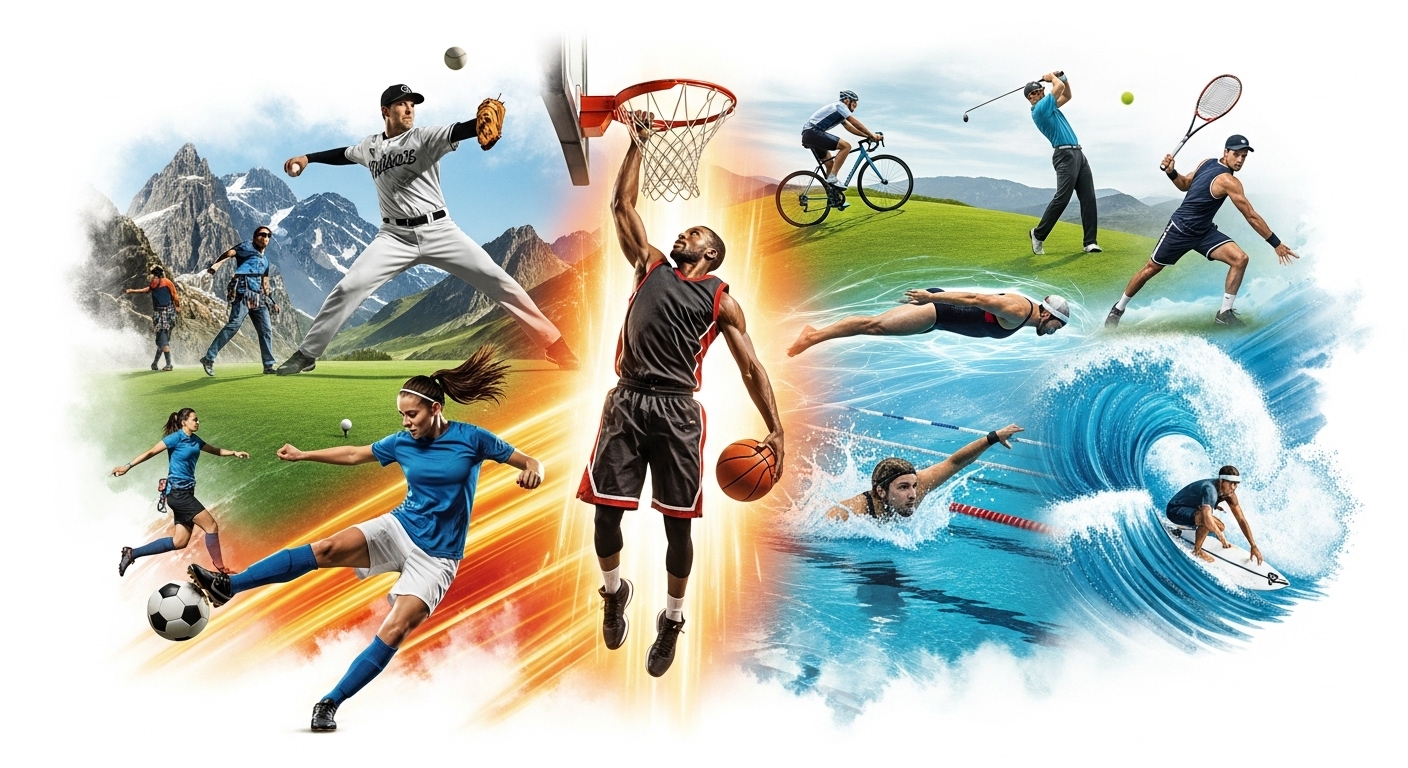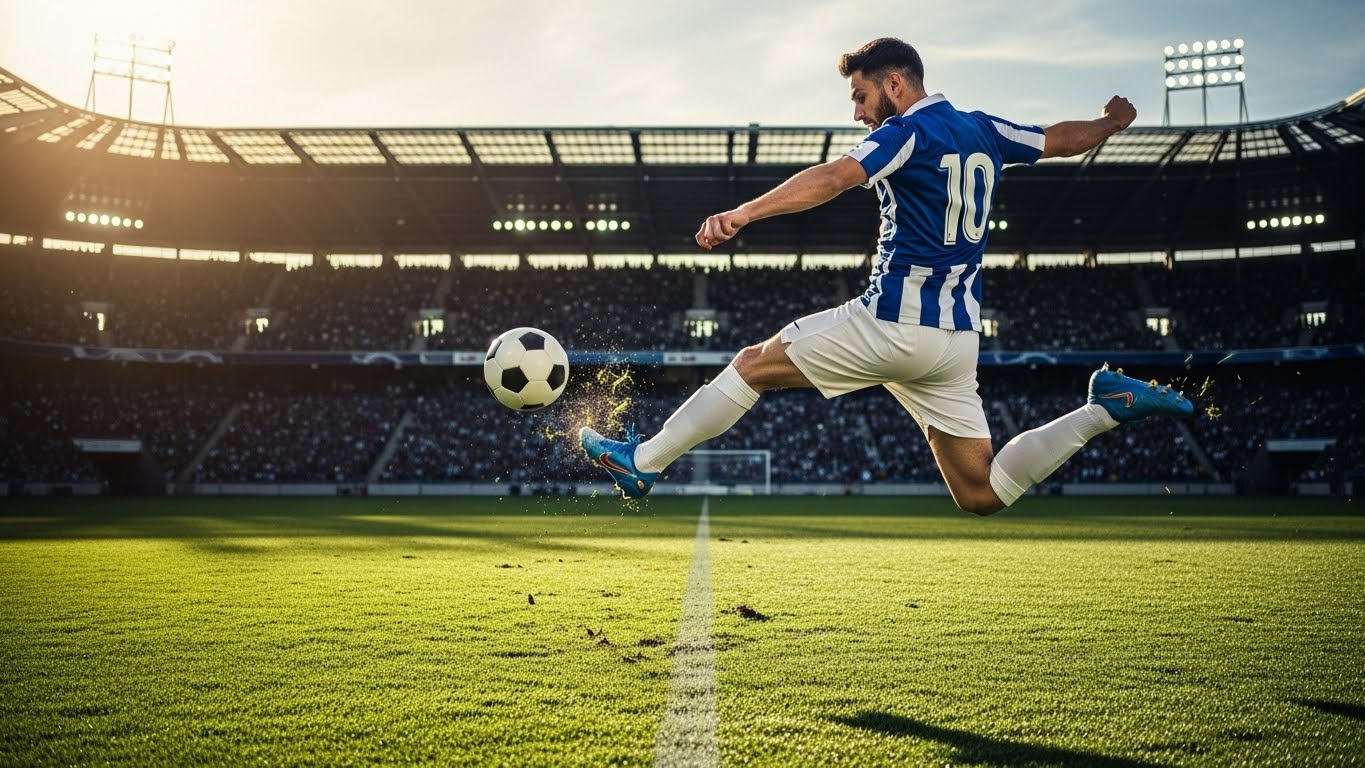Sports have always played an essential role in human history, from ancient civilizations to modern-day culture. The world of sports is not just a form of entertainment; it is an arena where individuals can showcase their skills, achieve personal milestones, and, most importantly, foster a sense of community. From the excitement of team games to the personal satisfaction of individual sports, the impact of sports transcends the field, influencing societal norms, personal growth, and even global politics.
In this blog post, we will explore the world of sports, focusing on its historical evolution, its role in personal and social development, and how it continues to shape modern society in profound ways. Whether through competition or collaboration, the world of sports remains a fundamental pillar of human life.
The Origins of Sports: A Journey Through Time
The origins of sports can be traced back to the earliest human civilizations, where physical contests were often used to settle disputes, prepare for war, or honor deities. One of the earliest recorded examples of organized sports comes from ancient Egypt, where physical games were held to celebrate the Pharaohs and gods. However, it was the Ancient Greeks who truly formalized the concept of competitive sports.
The Ancient Olympic Games, which began in 776 BCE, were a celebration of athleticism, discipline, and unity. These games were not just a competition between athletes; they were a way to honor the gods and bring together people from various city-states in a peaceful and competitive environment. The Greeks introduced disciplines such as running, wrestling, boxing, and chariot racing, which would eventually influence the sports we know today.
In the centuries that followed, sports continued to evolve, but it wasn’t until the 19th century that modern organized sports began to take shape. The Industrial Revolution played a pivotal role in the growth of sports by improving communication, transportation, and infrastructure, making it possible for people to come together and engage in competitive activities on a larger scale.
In the late 1800s, many of the sports we recognize today—football, rugby, tennis, and cricket—were formalized and began to spread across the globe. The creation of international competitions and leagues further transformed sports from simple games into global phenomena. These developments marked the beginning of a new era where sports could unite people from different backgrounds and cultures, creating a sense of shared identity and pride.
The Personal Benefits of Engaging in Sports
While the social and economic aspects of sports are often highlighted, the personal benefits of engaging in physical activity cannot be overstated. Sports provide an avenue for individuals to improve their physical health, develop essential life skills, and build personal resilience. Whether participating in a team sport or an individual pursuit, athletes gain much more than just a sense of victory.
Physical Health: The Foundation of Well-Being
One of the most immediate and obvious benefits of participating in sports is the improvement of physical health. Regular physical activity is essential for maintaining a healthy body and preventing a range of chronic conditions, including heart disease, diabetes, obesity, and hypertension. Many sports, such as running, swimming, and cycling, offer cardiovascular benefits that improve heart health and increase overall stamina.
Sports also promote the development of muscle strength, flexibility, and coordination. Activities like weightlifting, yoga, and gymnastics help strengthen bones and improve balance, reducing the risk of injury. Furthermore, engaging in sports helps individuals maintain a healthy weight by burning calories and boosting metabolism.
In addition to the physical benefits, sports have a direct impact on mental health. Studies have shown that regular physical activity can reduce stress, anxiety, and depression. Exercise stimulates the release of endorphins, the brain’s “feel-good” chemicals, which can improve mood and create a sense of well-being. Sports also provide an outlet for releasing pent-up emotions and frustrations, offering athletes a way to cope with life’s challenges in a healthy manner.
Mental Toughness and Discipline
Sports also foster mental toughness and resilience, teaching athletes how to persevere in the face of adversity. Whether competing in a high-stakes game or striving to improve personal performance, athletes often find themselves confronting obstacles that require both mental and physical strength. The ability to push through difficult situations, cope with setbacks, and maintain focus is a critical aspect of sports.
The discipline required in sports extends beyond the field or court. Athletes must adhere to strict training regimens, nutrition plans, and recovery schedules in order to perform at their best. This commitment to routine instills habits of consistency, self-control, and time management. In many ways, the discipline learned through sports can be applied to other areas of life, including education, career, and personal relationships.
Teamwork and Communication
For those involved in team sports, one of the most important lessons learned is the value of teamwork. Sports like soccer, basketball, rugby, and hockey require athletes to work together in a coordinated manner, with each individual playing a specific role to contribute to the team’s success. Effective communication, collaboration, and mutual trust are essential components of successful teamwork, and these skills are transferable to nearly every other aspect of life.
Through sports, athletes learn how to support their teammates, celebrate victories together, and face challenges as a collective unit. The sense of camaraderie built within teams often extends beyond the game itself, fostering lifelong friendships and a shared sense of purpose. Team sports also teach athletes the importance of shared responsibility and the understanding that every player’s contribution is vital to the team’s success.
The Social Impact of Sports: Fostering Unity and Cultural Exchange
In addition to the personal benefits, sports play a crucial role in fostering social cohesion and cultural exchange. The universal appeal of sports transcends geographic, linguistic, and cultural barriers, bringing people together in ways that other aspects of society often cannot. Sporting events, from local competitions to global tournaments, provide opportunities for people to bond, share experiences, and celebrate common interests.
National Pride and Unity
One of the most powerful aspects of sports is their ability to foster national pride and unity. International sporting events, such as the Olympics, the FIFA World Cup, and the Rugby World Cup, serve as platforms where nations come together to showcase their talent, spirit, and determination. When athletes compete on the world stage, they do so not only as individuals but as representatives of their countries.
The shared experience of supporting a national team during a major tournament creates a sense of collective identity and belonging. Fans from all walks of life rally behind their athletes, putting aside their differences in pursuit of a common goal. The excitement and energy surrounding these events can unite people of all ages, races, and backgrounds, reminding them of the strength and unity that comes from being part of a nation.
In some cases, sports can even help mend fractured relationships between nations. The “Ping Pong Diplomacy” between the United States and China in the 1970s is a classic example of how sports can serve as a bridge between divided nations. In this case, a simple exchange of table tennis players helped ease tensions and paved the way for the eventual normalization of diplomatic relations.
A Platform for Social Change
Beyond fostering unity, sports have long served as a platform for social and political change. Throughout history, athletes have used their influence and visibility to address issues such as racism, inequality, and human rights abuses. The most famous example of this is the 1968 Mexico City Olympics, where American sprinters Tommie Smith and John Carlos raised their fists in protest against racial injustice during their medal ceremony.
More recently, athletes like Colin Kaepernick, Serena Williams, and LeBron James have used their platforms to speak out against police brutality, discrimination, and other forms of social injustice. These athletes understand the power of sport to shape public opinion and drive change, and they use their influence to challenge societal norms and advocate for equality.
Sports have also played a role in promoting gender equality. The success of women’s athletes, from Serena Williams in tennis to Simone Biles in gymnastics, has helped break down barriers in sports and raise awareness about gender inequality. The fight for equal pay, equal opportunities, and recognition for women in sports continues to gain momentum, with movements like #MeToo and #TimesUp helping to further the cause.
The Business of Sports: A Multi-Billion-Dollar Industry
In the modern world, sports have evolved into a multi-billion-dollar industry. Professional sports leagues and organizations generate enormous revenue through broadcasting rights, sponsorships, ticket sales, and merchandise. The commercial success of sports has made athletes some of the highest-paid individuals in the world, with endorsements and sponsorships supplementing their salaries.
Major professional leagues, such as the National Football League (NFL), National Basketball Association (NBA), and English Premier League (EPL), represent some of the most lucrative sports enterprises globally. These leagues not only drive revenue but also have a significant influence on culture, media, and entertainment. The globalization of sports has led to massive growth in broadcasting and sponsorship deals, with brands eager to partner with high-profile athletes and teams to reach global audiences.
However, the commercialization of sports has not been without criticism. Some argue that the increasing influence of money in sports has undermined the integrity of the games, with financial incentives sometimes overshadowing the true spirit of competition. The rise of corporate sponsorships and media rights has also led to debates about the role of sports in society, with some questioning whether profits are taking precedence over the welfare of athletes.
The Future of Sports: Technology and Innovation
Looking ahead, the future of sports is poised for significant transformation, driven by technological innovation. Advances in virtual reality (VR), augmented reality (AR), and artificial intelligence (AI) are already beginning to reshape how fans experience sports and how athletes train and compete.
Virtual reality is set to revolutionize the way fans engage with sports, offering immersive experiences that make them feel as though they are inside the stadium or arena. Augmented reality can enhance live broadcasts, providing additional stats, player information, and interactive features that engage viewers in new ways. Meanwhile, artificial intelligence and data analytics are becoming integral to athlete training, injury prevention, and performance analysis.
The rise of esports, competitive video gaming, has also introduced a new dimension to the world of sports. With millions of fans and participants worldwide, esports has become a major industry in its own right, offering a new type of competition and entertainment that appeals to younger generations.
Conclusion: The Enduring Power of Sports
Sports are far more than just games; they are a reflection of our shared humanity. They bring people together, teach us valuable life lessons, and provide a platform for personal achievement and social change. Whether through the thrill of competition or the joy of community, sports continue to inspire and unite individuals across the globe. In an ever-evolving world, the power of sports remains enduring, offering an opportunity for personal growth, cultural exchange, and collective achievement. As we move forward, sports will undoubtedly continue to shape the way we connect, communicate, and challenge ourselves.



